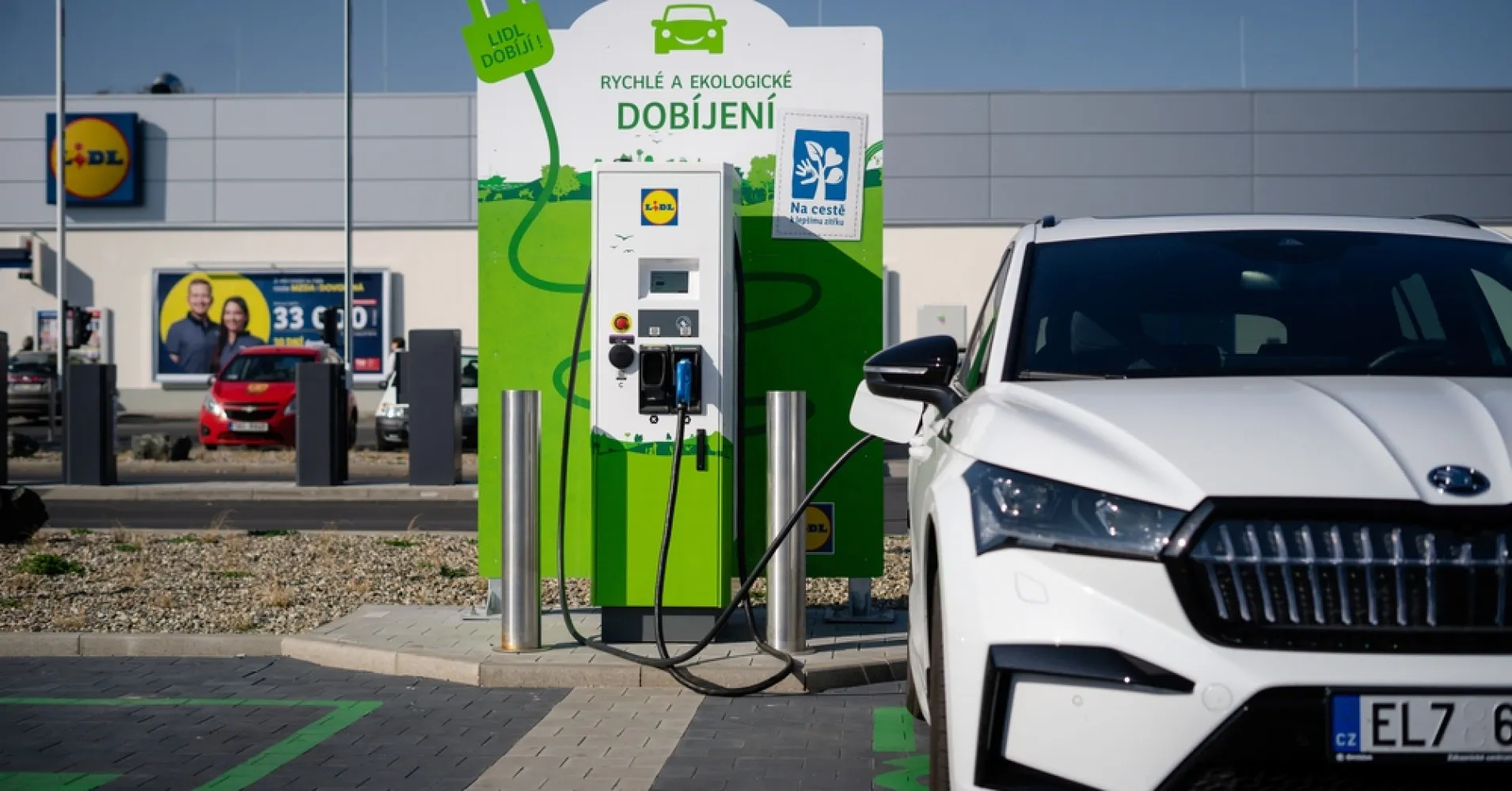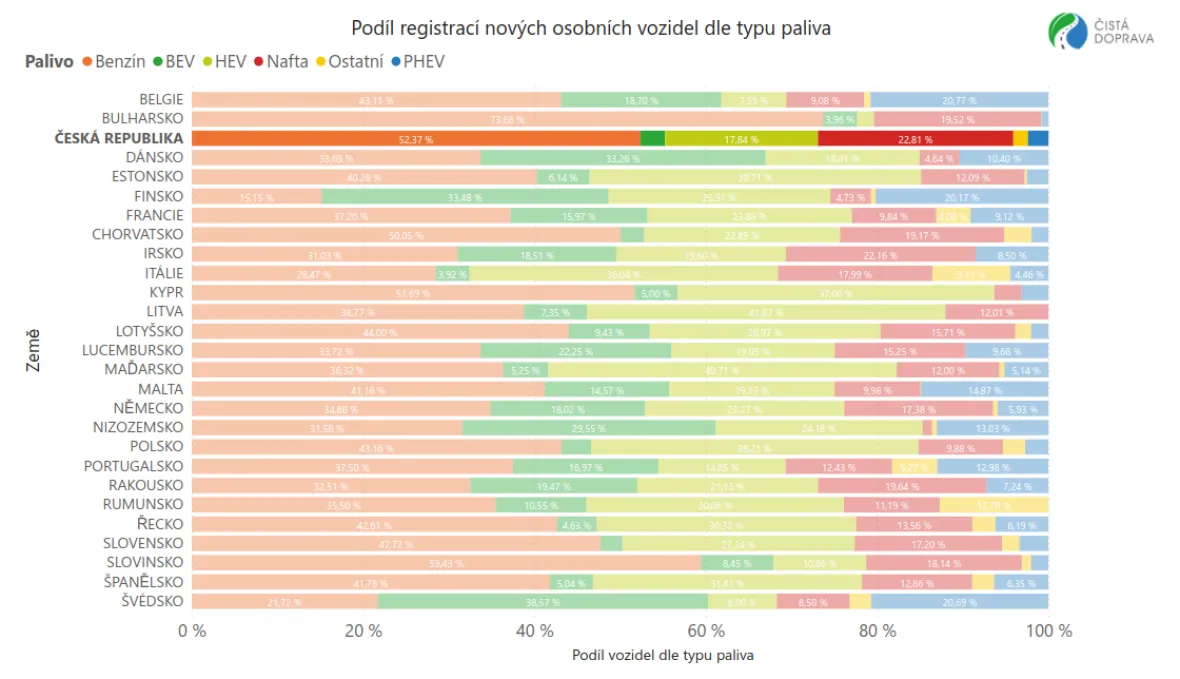Petr Fiala’s government plans to heavily support the sale of electric cars from December. It is launching a call to support the purchase of cars with electric or hydrogen drive as well as the acquisition and construction of charging stations. Companies will be offered subsidies for this, in total entrepreneurs will be able to receive up to 1.95 billion crowns. The program of the Ministry of Industry and Trade (MPO) called “Electromobility Guarantee – I. challenge” is financed from the National Recovery Plan, i.e. from the funds of the European Union. This also means that the program must find enough interested parties, otherwise the EU will not pay for it.
“At the moment, we assume that small, medium and large enterprises will be able to submit applications from January 1, 2024 to September 30, 2025,” explains Petra Milcová from the department of communication of the Ministry of Industry.
Data on the number of electric cars in the Czech Republic and the EU. Photo: Clean transport
Support will be provided in the form of a bank guarantee for a commercial loan and a financial contribution through the National Development Bank (NRB). From this, the state promises that even those entrepreneurs who could not afford to purchase it themselves will be able to obtain financing. According to Milcová, in the case of the subsidies themselves, this would be a too general measure without much effect.
NRB will provide a guarantee to entrepreneurs for a loan from a financing entity, through which they will purchase a car and a charging station. A guarantee can be provided up to 70 percent of the principal amount. In the case of purchasing a car, for example, the development bank can provide a guarantee for a loan from 300,000 to 1.5 million crowns, according to the ministry.
“We see two main reasons why companies in the Czech Republic purchase electric cars. They are motivated by subsidies, which are not available until the launch of this program, and above all the possibility to park anywhere in Prague for free, but the city plans to cancel this benefit soon. That’s why we decided to take advantage of the possibility of European funding and launch a call to support electromobility,” he told the website E15 Senior Director of the EU Funds Section Marian Piecha from the Ministry of Industry and Trade. The server was the first to report on subsidies for electric cars.
The maximum financial contribution can be up to 200,000 crowns for passenger electric cars, 300,000 crowns for trucks or hydrogen vehicles, and 50 to 150,000 crowns for the purchase of charging stations depending on the type and performance. In the total volume, 1.65 billion crowns out of 1.95 billion are intended for the cars themselves, and another 300 million for chargers.
Limits for reimbursement
The program falls under the National Recovery Plan supported by European Union funds. The condition is that the sale of at least 4,555 cars should be supported in this way. Afterwards, the MPO can ask the European Commission to reimburse the funds.
The resort is confident that trouble will not arise. “Submitting applications will be easy, so we expect that the entire support will be used up quickly, probably already during 2024,” believes Milcová.
The Czech Republic is behind
The Czech Republic has never been one of the bastions of electromobility. According to recent data from the Transport Research Center under the Ministry of Transport, 20,323 passenger battery cars were registered in the country as of September 30, 2023. In an international comparison, the Czech Republic finished in the share of registrations of new personal battery electric vehicles among the countries of the European Union with 2.8 percent, ahead of Slovakia in the penultimate place. For a long time, we also belong to the countries with the highest share of cars with internal combustion engines.
But over the past nine months, the number of battery-powered vehicles has increased by 45 percent, with 6,268 vehicles registered, and classic electric cars are also gaining in popularity over plug-in hybrids.
Data on the number of electric cars in the Czech Republic and the EU. Photo: Clean transport
Key subsidies
Subsidies, which many see as a key motivational element, could help. It happened in the past in the countries of Western Europe that interest in electric cars fell dramatically when governments canceled or limited incentives. An example was Germany, we wrote more about it here.
According to Zdenek Petzlo, executive director of the Association of the Automotive Industry, the problem is primarily the higher purchase price, but also the pressure to quickly switch to “greener” types of drive. “We believe that at the current stage, systemic support for clean mobility by governments remains essential. A very good example is the positive measure of Minister Stanjura, specifically the reduction of the tax burden of an employee who uses a company car for personal trips as well,” he told the Echo24 newspaper.
Another obstacle is that the incentives are often directed primarily at companies. “In the conditions of the Czech Republic, when roughly two-thirds of vehicles are registered to companies and in the case of electric cars it is up to 90 percent, I understand that incentives are mainly aimed at this segment,” says Petzl. According to him, it would also be good if the state did not forget about ordinary citizens, for example the owners of houses with solar panels.
CEO of Czech Kia Arnošt Barna partially agrees with Petzl. “The subsidy for the purchase of an electric car is absolutely essential in this area. The faster development of electromobility in Western markets was often due to the fact that local governments supported the purchase of electric cars, mostly with sums between 100 and 300 thousand crowns per unit,” he said in a recent interview.
According to him, the market structure in the Czech Republic is nevertheless different from that in the West. “Of the total market, corporate customers buy 75 percent of cars, and only 25 percent are bought by individuals from their taxable income. Therefore, in our case, I would consider it a key support for the purchase of electric cars for companies, because it can be assumed that private users will find their way to electric cars precisely through used cars, which are first purchased by companies and after 3 to 5 years, they retire these cars and provide access to these cars at a reasonable price to regular customers,” he adds.
2023-11-28 18:20:00
#state #launching #fabulous #subsidies #electric #cars #interest #billion #Czechs #pockets #Echo24.cz

